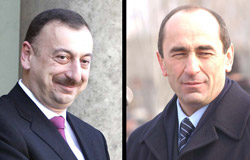June 5 marked the end of the two-day Karabagh conflict negotiations between Armenian president Robert Kocharyan and Azerbaijani president Heydar Aliev. The two presidents had left for Bucharest in order to participate in the Black Sea Dialogue and Cooperation Summit.
It was clear from the start that the negotiations in Bucharest were going to be the same as the previous ones. The negotiators left for Bucharest announcing beforehand that neither one had any serious expectations. The OSCE Minsk group co-chairmen were the only ones who were optimistic once again.
“The Karabagh conflict can and must be resolved. The only way to solve it is through establishing peace,” said the deputy U.S. state secretary of European and Eurasian issues Daniel Frid. According to him, the U.S. had reached an agreement back then, but the sides hadn’t made a final agreement.
“We are still close to it and it’s quite possible that this time an agreement will be made,” said Frid before the negotiations and emphasized that their organization will not pressure the sides to choose this or that resolution.
“We simply suggested the variants neutrally. But as a representative of the U.S., I have told them that the U.S. would like to see as many territories as possible returned to Azerbaijan and have the Azerbaijani return to their residencies. This is in the interest of both countries. There are a series of variants and the U.S. has suggested the most effective one. Now, it all depends on the presidents,” he said.
American co-chairman of the OSCE Minsk group Steven Mann said that “the presidents of Armenia and Azerbaijan are really interested in the negotiations.”
In response to the question as to whether the second day of negotiations means that there is some progress in the negotiations, Mann said that the sides always hope for progress. As for Russian co-chairman Yuri Merzlakov, he said that each side is responsible for reaching an agreement.
The first meeting of Kocharyan and Aliev in Bucharest began with current president of the OSCE Karl de Gucht, the Minsk group co-chairmen, personal representative of the OSCE president Kasprchik, as well as the foreign affairs ministers of Armenia and Karabagh at the Polish embassy in Romania. Afterwards, according to sources, the two presidents held talks privately. Then the large-scale negotiations started again. The meeting on June 4 took two and half hours and ended at 11:00 p.m. Yerevan time. After that, Kocharyan and Aliev dined with president of Romania Trayan Basesku late at night.
Before the summit, R. Kocharyan had met with OSCE president Karl de Gucht, deputy national security adviser to the U.S. president, J. Kruach and EU special representative in the Southern Caucasus P. Semnebi. Aliev also met with them. The Kocharyan-Aliev meeting followed at the “Marriot” hotel in Bucharest. However, according to Russian media, the meeting on June 5 only took 40 minutes. Robert Kocharyan came out of the hotel first and went to the airport with Vartan Oskanyan. After a while, Aliev came out of the hotel with Eldar Mamedyarov. It’s obvious that both sides haven’t agreed on minor issues. What’s unclear is why the negotiations ended so early.
Armenian political figures also didn’t have huge expectations. However, they did advise evaluating the negotiations after knowing the results. The only person who actually had certain expectations was Grigor Markaryan, who is the leader of the National Assembly’s newly founded “Businessman” faction and member of the European Council delegation.
“Kocharyan said that he doesn’t have any serious expectations. But we all expect that conflict to be resolved as soon as possible and it must be in favor of Armenia. As a member of the European Council, I believe that Azerbaijan must go along with Armenia’s proposals. The Armenian side believes that the national self-determination right must play a key role in the conflict resolution,” says G. Markaryan and brings up the example of Chernogoria. “Armenians living in Armenia also believe that the Armenians of Karabagh need to be independent. This is our perspective. Whether that’s OK for Azerbaijan or not, it’s their problem,” he says.
MP of the National Assembly Republican faction Armen Ashotyan doesn’t want to see “a rather outlined, apocalyptic scenario”, planned out by some mass media and political figures, become a reality.
“I don’t expect anything because there is no imperative approach to the Karabagh conflict resolution process, no matter which international organization or great power talks about that,” says Ashotyan.
According to him, the main solvers of the Karabagh conflict are the people of Armenia, Karabagh and Azerbaijan. But the opinions expressed by these societies differ from one another and “those opinions don’t instill any hope for compromise”. So, based on Ashotyan’s opinion, the best solution right now is to prolong the status-quo.

